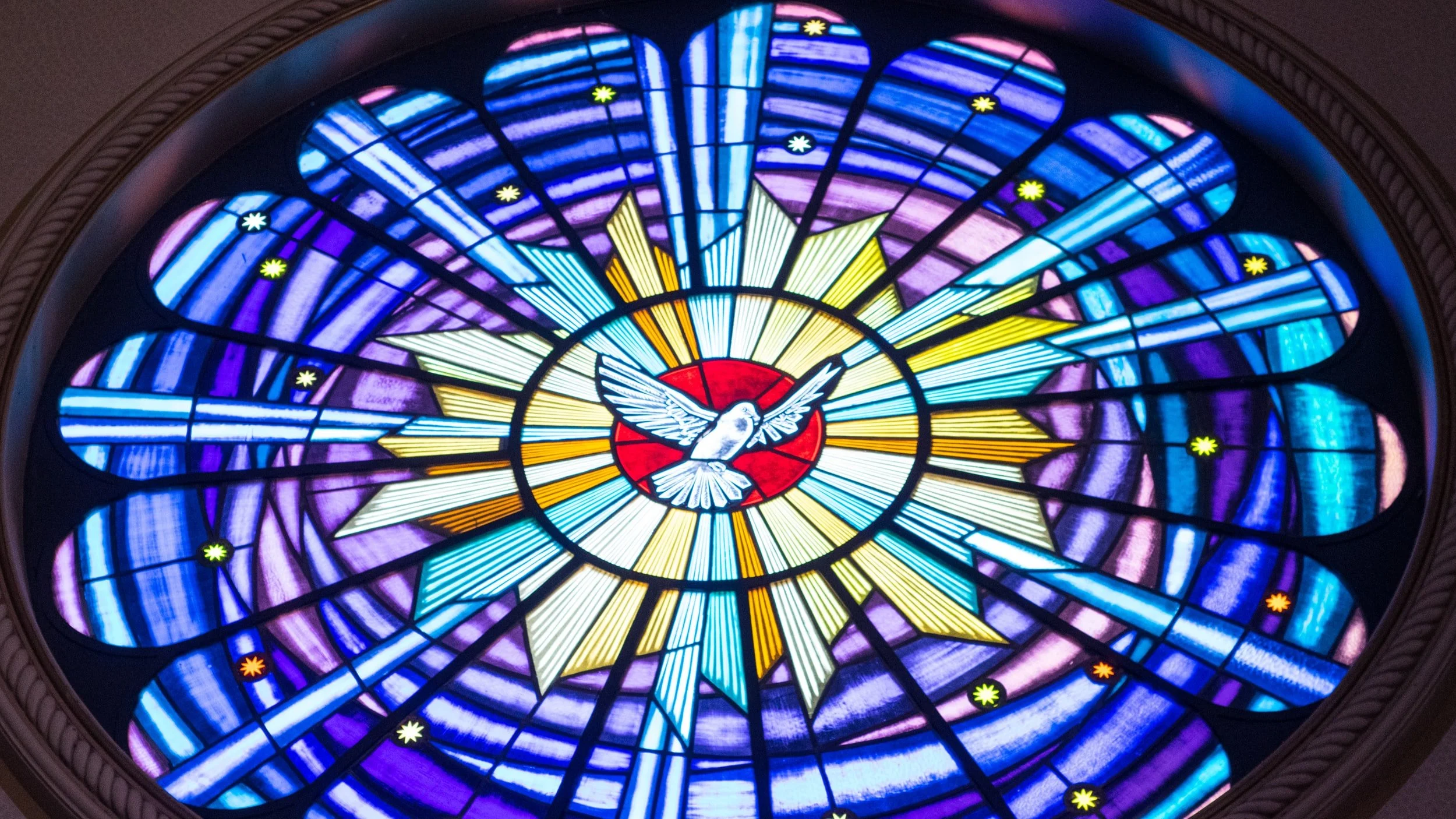The Holy Who?
Many of us who grew up in church know about God the Father. He’s the God who sits up in heaven somewhere, frowning down upon us sinful people. He’s impatiently waiting the day that he can finally unleash his judgment on the world.
We definitely know about God the Son, Jesus Christ. He’s the God who saved us from his wrathful Father. He’s currently standing between us and the Father, holding the doom and fire of his wrath at bay. He’s the God of love.
We’re not so sure about the Holy Spirit… what does he do? Unless we grew up in a Pentecostal church, the Holy Spirit is equated more or less to your conscience - he tells you when you’ve done something wrong by way of a sneaking guilty feeling.
I really hope you know that none of these theologies are right.
Unfortunately, many of us subconsciously carry these images of God with us into adulthood. Depending on where you grew up, these theologies of God might be all too familiar to you.
Previously, I’ve discussed the ways in which we understand God’s work of atonement.
Today, I’m going to talk about the Holy Spirit. It is, after all, the week of Pentecost.
What is Pentecost?
Pentecost literally means “fiftieth,” referring to the day that falls fifty days after Easter Sunday. It is the day on which Christians celebrate the coming of the Holy Spirit on the disciples of Christ as “tongues of fire.” It is the day on which the Christian church began.
Pentecost is a Christian holiday that is vastly undercelebrated in the Western Church. In the town and church I grew up in, Pentecost was known as “the fishing holiday.” Everyone packed their campers and took off for an extra-long weekend of camping and fishing. Not exactly a religious observance.
Theologian Daniel Migliore puts it this way:
“When the work of the Holy Spirit is forgotten or suppressed, the power of God is apt to be understood as distant, hierarchical, and coercive.” (Faith Seeking Understanding, 233)
In other words, when we forget or shut down the work of the Holy Spirit, we misunderstand God as the distant, wrathful Father, and Jesus Christ is overemphasized as the only “true” representation of God.
Pentecost is when we celebrate and remember the coming of the Holy Spirit.
The Christian God is Triune. We are in great error if we forget the Third Person of the Trinity. He is not an afterthought. He is equal to the Father and the Son.
The problem is, the Holy Spirit is… well, he’s a spirit. Spirits are not seen. They are not tangibly felt or heard - not often, anyway. The Spirit, unlike Jesus Christ, has not taken a physical form or physically walked this earth. He resists being put into a form that we can recognize and worship. It requires faith to believe in the Holy Spirit, and faith is something in short supply in our world.
As a side note, there are many arguments for whether the Holy Spirit even ought to be referred to with male pronouns; for the sake of this post, I will refer to the Spirit as “he” in order to avoid calling the Spirit an “it.” Obviously, God is transcendent above and beyond gender since he created male and female, but that discussion is outside the scope of this post.
So, who is the Holy Spirit?
After Jesus died and rose from the dead, he walked and talked with his disciples for forty days. At this time, he ascended into heaven (wouldn’t that have been something to see!). For ten days after the ascension, the disciples gathered together and prayed as they waited for the coming of the promised Holy Spirit (see Acts 1:4-8, 12-14, 2:1).
(I have many questions here, like why did it take an additional ten days after the ascension for the Spirit to descend? Was there a delay in communication in the heavenly realms??)
We have to understand that the Holy Spirit was not a foreign concept to the Jewish followers of Christ. The Spirit of God is often mentioned throughout the Old Testament - he is intimately involved in creation and in the work of the judges, prophets, and kings (for example, see Gen. 1:2, Judges 11:29, 1 Sam. 16:13, Ezek. 2:2).
In the Old Testament, the Holy Spirit came and went as God decided he would. We often read of the Spirit “coming upon” someone or “departing” from someone (see 1 Sam. 15:14). The Spirit would even “come upon” people who were blatantly disobedient to God (for example, the wayward Samson in Judges 15:14 or the vengeful King Saul in 1 Sam. 19:19-24).
The Spirit of God was the presence of God on those whom he chose for his purposes, regardless of the person’s righteousness (or lack of it).
The power of the Spirit of God was not unknown to the disciples of Jesus. They knew exactly how weird and wacky the Spirit of God could be. They knew the stories of King Saul lying naked beside the road while “under the influence” of the Holy Spirit (1 Sam. 19:24). They also knew that the Spirit of God could compel even those who were not willing to speak on God’s behalf (see Num. 23:27-24:5).
There was no predicting the presence or work of the Holy Spirit.
However, after Pentecost, the Holy Spirit’s work and presence became available and accessible to all who believed in Jesus Christ.
Peter’s impassioned speech following the coming of the Spirit upon him and his fellow disciples makes his message clear: The Holy Spirit has finally come upon all people, as the prophet Joel prophesied (Joel 2:28-32, Acts 2:16-21), and this Holy Spirit was sent as a result of Christ’s death, resurrection, and ascension.
“God has raised this Jesus to life, and we are all witnesses of it. Exalted to the right hand of God, he has received from the Father the promised Holy Spirit and has poured out what you now see and hear.”
The result of the outpouring of the Holy Spirit?
Weird and wacky things.
The book of Acts is full of miraculous healings and conversions of all people and all nations. The Spirit of God defies logic and reason; he defies empires.
The Roman Empire first viewed Christianity as an innocent Jewish spinoff, but quickly labeled it as a dangerous sect that threatened the very fabric of Roman society. Their claim to the “One True God” was offensive to Rome’s paganism and imperial cult (emperor worship).
The message of Christianity is still offensive to many. But to others, it is life.
Four reasons why the Holy Spirit is still subversive (and still life-giving):
The Holy Spirit is God’s gift to us.
In the same manner as the atonement of Christ, the presence of the Spirit is a gift given to the people of God. There is nothing that we can do to obtain the Spirit of God - nothing but open-handed reception of this gift and the “response of trust and acceptance of God’s unconditional acceptance of us.” (Migliore, 247)
What a gift! Yet, how offensive to those who want God’s presence on their own terms and in their own way.
The Holy Spirit is God with us.
The Spirit would no longer come upon and depart from people as God pleased, but would remain an active presence in the world as a result of Jesus’ atoning work on the cross. Without getting too technical, the death and resurrection of Jesus broke open the heavens for God’s presence to live among his people without the necessity of a temple.
Just think for a minute how completely crazy that would have sounded to the first-century Jew whose entire life and history had been centred around worship of God at the temple in Jerusalem!
It is the presence of the Holy Spirit that makes the Christian church the new dwelling place of God. In fact, the Spirit’s weird and wacky work was crucial for the growth of the newly-born church across the Roman Empire and it is still inseparable from the explosion of Christianity in South America and Asia today.
How amazing! But also offensive to those who try to exert power and control in the name of Jesus (for example, colonialism conquered lands in the name of God and Church; closer to our day, some American politicians claim political authority based on their relationship to the evangelical church). The Holy Spirit cannot be controlled or wielded.
The Holy Spirit bears witness to Christ in the here and now.
The Holy Spirit bridges the gap between the day of Pentecost in the first century and life in the 21st century. He makes Christianity relevant for us today.
The Holy Spirit necessarily points to Christ. He is a witness of Christ’s work and he binds believers to him, creating a new community that expands far beyond the borders of Israel (or your own faith community). Jesus Christ isn’t some far-off historical figure; “he is present here and now to us - in the power of the Spirit.” (Migliore, 237)
This means that every Christ-follower has the power and presence of God with them at any given moment. It means that God lives among every body of believers gathering together today, regardless of race, ethnicity, or language.
How absolutely astounding! But also quite offensive to those who wish to stake a claim exclusively on God’s presence within their community. God loves all people; you can’t get around the fact that this includes all the people who are quite unlike you.
The Holy Spirit is the power of new freedom in Christ.
We are free people! Not free to choose whatever you please, but free to live a life that is patterned after God’s own self-giving love. We are free to love others deeply and radically, to unite with people who are unlike us, and to use the gifts of love that we have been granted for the purpose of building up those around us and ushering in God’s kingdom in its fullness.
The presence of the Holy Spirit means that we cannot be blind to injustice in our world. We cannot be silent when others are oppressed. We must be advocates of peace, hope, and love, just as the Holy Spirit is our Advocate.
How incredible! But also quite irritating, because this means that we can’t live our lives as we please. Instead, we are bound to the way of Christ - a way that is difficult, selfless, and seeks love at all costs.
The Holy Spirit is dangerous.
He is subversive. He rubs against the grains of our humanity. You can’t encounter the Spirit of God and not be changed.
I think this is one of the reasons why we avoid the Spirit of God in our churches and Christian communities. The Spirit is risky. He requires full surrender of our hearts and lives… and we have no idea what he will do with our lives when we do so.
We have to trust.
We have to take our hands off the wheel and trust that God has got this.
He is God, after all. I am not.
We literal-minded, factual, logic-oriented, Enlightenment-influenced Westerners have a heck of a time trying to understand that. As a result, we have all but eliminated the Holy Spirit from many of our churches.
What a shame.
The Spirit is God. He is not some ethereal being doing God’s work or your moral conscience. He is God.
This Spirit of God is embodied in the Christian church.
As the church lives and worships together, the Spirit is present, working to bring the kingdom of God to the here and now.
So naturally, a sign of the Holy Spirit is an active church.
By “active,” I mean a church that loves, serves, teaches, helps, and encourages one another. It is the church that cares for its own and for the outsider all the same. It is the church that worships God together, offers hospitality, and seeks to know and experience God together.
This does not mean that the Holy Spirit is only present within the church. He is the God of all creation, and all of creation groans together with the Spirit as it awaits its final restoration (Rom. 8:20-23.).
It also does not mean that the church is perfect. Not at all! We are a group of human beings - often thrown together from various backgrounds and traditions. We are bound to mess up.
We are called to surrender to the weird and wacky work of the Spirit in us, no matter the cost.
What makes Christ-followers stand out from the crowd is that we recognize the ways in which we are offended by the Holy Spirit and we say, “Yes,” to his changing work in us both individually and corporately. We know that we are fully and completely loved by our Father, our Brother, and the Spirit living within us.
Are you prepared to have the Spirit change you?
Are you willing to allow him to work in and through you in weird and wacky ways for the sake of others?
Are you willing to give up control to the Spirit who lives within you and is closer than your very breath?
This is a daily battle. Pentecost is our reminder that the battle has already been won by the coming of the Holy Spirit. Celebrate that, my friends, knowing that the gift of God’s Spirit lives in you here and now, freeing you to love and hope with wild abandon!
In courage and in love,
Katelyn
Recommended reading:
Migliore, Daniel L. “The Holy Spirit and the Christian Life,” Faith Seeking Understanding: An Introduction to Christian Theology, 3rd ed. Grand Rapids, MI: William B. Eerdmans Publishing Company, 2014.







